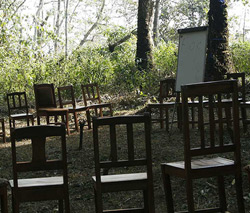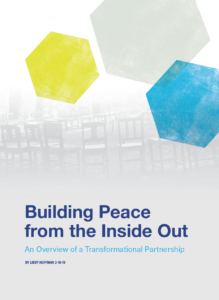All of our work, in collaboration with Fambul Tok and in dialogue and exchange with peace practitioners globally, begins with this conviction: the answers are there.
Even with all that has happened in places afflicted by conflict and tragedy, we believe communities have within themselves the answers to the challenges they face. And we have seen time and time again that the role of outsiders is not to come and “save” communities but to help create and hold space for the answers and resources already there to emerge. In conversation and collaboration, communities can build on and magnify their resources, and outsiders can support their work by acknowledging our deep human connectedness and listening carefully to clarify our own work of accompaniment, the work to which we are best suited.
At the heart of this belief is a vision of wholeness — of how a whole, healthy and connected system of aid and governance should work, from every level, and of how every one of us can bring our whole selves to our individual work. When we hold the expectation of wholeness, we invite wisdom, creativity, and new perspectives to help us envision and enact systems which draw on the best of the whole, rather than recreating long held patterns of hierarchy and division. In this way of working, we do not wait for the conditions of our broken system to change. Instead, we live into the system as it could be, from wherever we are right now.
In a system that is whole, the varied levels of aid and support are not fragmented and separate from each other and from the target community but rather are nested all together as parts of a larger, interconnected whole, with each level holding the highest purpose and potential of that sector or level.
At Catalyst for Peace, we believe that we — all of us — work as part of a much larger whole. Sometimes we can see this tangibly, and sometimes we can’t. In our work, we must seek out, trust, and live into the wholeness that holds us. We have also lived into the challenges of this approach, which requires openness, courage, humility, and trust. And we have seen how working from wholeness can unleash the potential of every person at every level — and how that potential, when in service of a vision imagined and led by communities, can transform society — from the inside, out.


